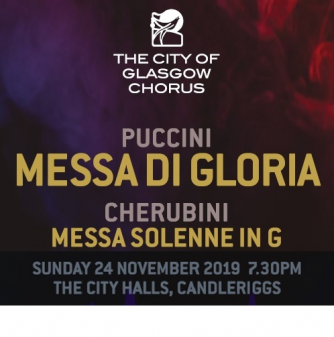Details
City Halls
Candleriggs
Glasgow
G1 1NQ
Scotland
Programme
Giacomo Puccini – Messa di Gloria
Luigi Cherubini – Messa Solenne in G Major
Performers
Matthew McKinney – Tenor
Colin Murray – baritone
Graham Taylor – Conductor
City of Glasgow Chorus
Orchestra of Scottish Opera
Programme Note
The City of Glasgow Chorus is proud to present two quite remarkable compositions that ended up in a drawer and forgotten about almost before the ink was dry.
Puccini’s Messa di Gloria, composed at a tender eighteen years young, was first performed in Lucca in 1880 to critical acclaim, only to be put in a drawer and forgotten about. Poor Puccini was never to hear it again in his lifetime. In 1952. Father Dante del Fiorentino, who knew Puccini as a young curate, came across the manuscript when visiting Lucca to collect material for a biography of the composer. Next performed in Chicago in 1952, seventy-two years after its premiere in Lucca, it is now a regular and a favourite in the choral repertoire. It is thought Puccini actually intended it to be a “farewell” to his association with sacred music as he turned his attentions to opera. Its style is operatic and was clearly influenced by Puccini’s hero, Verdi, a style evident in other choral works including Rossini’s Petite Messe Solennelle and the Verdi Requiem.
Cherubini, much admired by Beethoven no less, was commissioned by Louis XVIII to compose a mass for his own coronation but for political reasons, decided not to go ahead with the ceremony and this work too was put in a drawer and forgotten. Some sixty-five years later, Cherubini’s heirs discovered the work and sanctioned its publication in 1884. Ownership of the material changed hands several times and it was only in 1989 that the first recording was made of this fine work. The Mass is quite different from almost all the other Mass settings and is full of energy, colour and also a touch of humour!

 Your events at Classical Events
Your events at Classical Events

